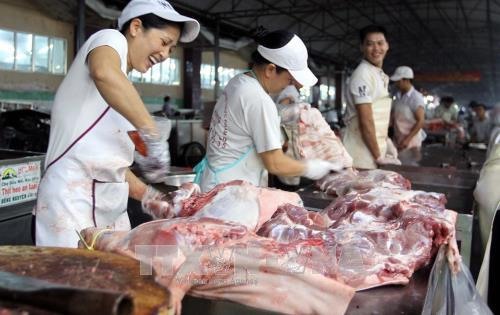 Society
Society

The HCM City People’s Committee has approved a pilot programme to sell safe food at two traditional markets -- Bến Thành Market and the Hóc Môn Wholesale Market in the district of the same name.
 |
| Pork sellers at Hóc Môn Wholesale Market, which will be one of the first two to pilot a safe-food market model in HCM City. — VNA/VNS Photo Thanh Vũ |
HCM CITY — The HCM City People’s Committee has approved a pilot programme to sell safe food at two traditional markets -- Bến Thành Market and the Hóc Môn Wholesale Market in the district of the same name.
It will be gradually expanded to all markets in the city by 2020.
The Hóc Môn market is the largest pork supplier in the city, accounting for 50-55 per cent of the total demand, while Bến Thành is a symbol of the traditional Vietnamese market and gets an average of 10,000 visitors a day.
The sellers selected for the pilot programme have to meet three basic criteria -- have a business licence and a food safety and hygiene certificate and ensure clear product origins.
The Food Safety Management Board said it would work with relevant departments to guide the sellers and closely monitor their business activities to impose sanctions on those violating food safety regulations.
A team of 14 officials from the board will be sent to the Hóc Môn market to monitor the safe food operation.
They will work with the market’s management to monitor the tracking of the origin of pork under a programme launched a few months ago by the Department of Industry and Trade.
For vegetables and fruits, the team will help sellers set up a record system to track information about the sources of the products entering and leaving the market.
Bến Thành Market will be monitored by its own management, which will organise training courses in tracing pork origin and food safety regulations for sellers.
Small sellers worry
Lan Huệ, a food seller in Bến Thành Market, told Tuổi Trẻ (Youth) newspaper that she is thrilled with the news about the safe food markets, but added: “The markets’ management should soon announce which [food safety and hygiene] standards need to be complied with for better and early preparation.”
But some sellers at the Hóc Môn market are said to be very worried about the feasibility of applying food safety and hygiene standards for all the foods they sell.
They are mostly small sellers who buy products from many different suppliers mainly based on price.
Nguyễn Thị Lan, who sells pork at the market, said small sellers like herself would face many difficulties when the safe market programme is piloted since they lack the financial resources to buy tablets to showcase their products and food safety tools and equipment.
Another seller at Bến Thành said to successfully pilot the programme attention should be paid to how to support small sellers with limited resources.
It would prevent these small sellers from conducting business around the pilot market, making it harder to thoroughly monitor food safety and hygiene, he said.
Phạm Khánh Phong Lan, head of the Food Safety Management Board, said her organisation is reviewing the conditions at the markets and checking products’ origin to issue food safety certificates to sellers.
Then it would offer food safety training for them and check their health, she said.
The markets’ conditions are still poor, and so it is important to have this pilot safe-food programme to prepare them, she said.
“I think sellers should also invest in upgrading their business and checking the sources of their products to ensure food safety.
“Modern grocery stores are now developing at a very fast pace and paying closer attention to food safety issues. If traditional markets do not change themselves, they will lose customers.” — VNS




